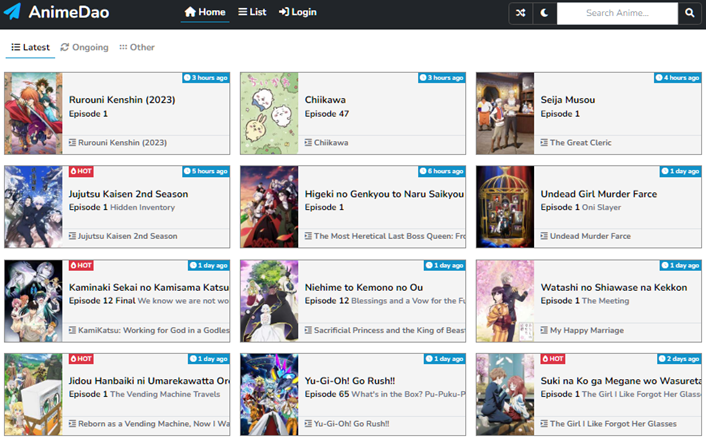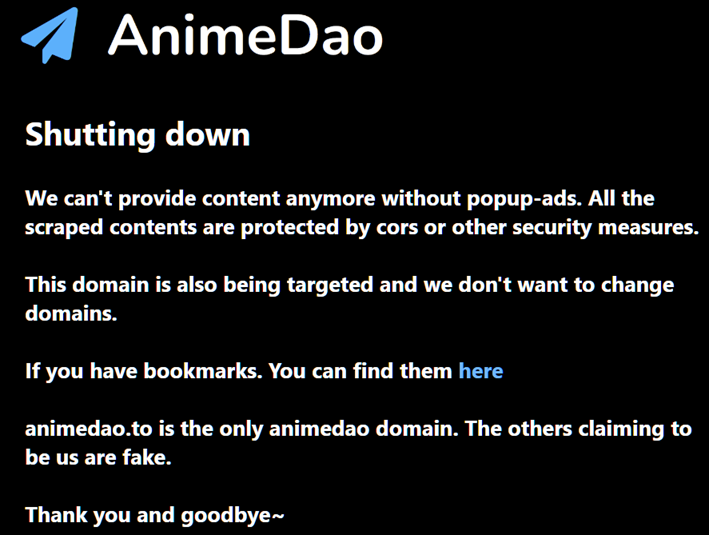It’s no secret that the majority of mainstream movies appear on pirate sites soon after their release. In that respect, not much has changed since the early 2000s. Pirate site aesthetics, on the other hand, have undergone a transformation.
Today’s pirate movie and TV show sites are considerably more polished, often carrying official poster images and metadata to give that Netflix-style feel. Pirate sites offering Japanese cartoons (anime) often look so good they could easily pass for legitimate platforms.
These glossy sites receive hundreds of millions of visits every month from extraordinarily enthusiastic fans who happily soak up every available detail but mostly pay nothing for the privilege.
Japanese rightsholders are making progress against anime piracy, even in challenging overseas territories such as Brazil. But having spotted the pots of gold at the end of the anime rainbow, companies like Disney also have content to protect. With decades of experience doing just that, there’s little doubt that the pressure is building.
DMCA Subpoenas, Visit to Vietnam
During the last week of June, high-level executives from the Motion Picture Association visited Vietnam, a hotbed of some of the most polished and popular pirate sites to ever exist. The visit coincided with the takedown of Vietnam-based 2Embed, a site that supplied hundreds of other sites with video content.
Authorities in Vietnam welcomed enhanced cooperation with ACE to tackle other pirate sites moving forward, but a visit to court in the United States and a routine application for a DMCA subpoena against Cloudflare was also delivering results.

In the wake of our initial report on the subpoena early July, one of the targeted sites ‘Anime Kaizoku’ indicated it had thrown in the towel. Now a considerably larger platform claims to have done the same.
Animedao.to Announces Shutdown
Recent data published by SimilarWeb indicate that AnimeDao received over 54 million visits in three recent months. In April, the pirate anime site welcomed around 19.1 million visitors, and in May, around 18.1 million.
June’s figures were lower at 16.9 million visits, but with the majority of visitors arriving from the United States, it was inevitable that anti-piracy group ACE would eventually take action.

The DMCA subpoena provided fairly clear evidence that the site was under some type of investigation but what lies ahead after more recent developments is unclear.
As the image below shows, AnimeDao has now decided that for financial, technical, and legal reasons, its days of servicing millions of visitors each month are over.

The comment about content no longer being available without popup ads is interesting. While situations vary, it may suggest that at least some content arrives as a package and is intended to be consumed in a particular way, i.e. while being monetized.
The statement about CORS relates to cross-origin resource sharing, a browser mechanism that controls access to resources located outside of a given domain. This suggests that content that may otherwise have been accessible from other platforms is being restricted.
The final comment about ‘being targeted’ is self-explanatory but how that will play out, especially given recent events, is open for debate.
Problematic Resurrections
Following MPA/ACE’s visit to Vietnam, Zoro.to – until recently the world’s most popular pirate site – suddenly shut itself down and handed its domains over to the MPA.
Had that been the end of the matter, Hollywood would’ve probably mentioned it via a press release. What actually happened is that within hours of Zoro.to’s closure, it reemerged under a new domain (aniwatch.to) with all-new branding.
That could suggest that if any agreement was in place with the operator of Zoro, it might not have taken the form of a cast-iron legal contract usually associated with ACE activity. Whether that indicates one of the parties not taking things particularly seriously is open to speculation but the recent reemergence of former fan-favorite Aniwatch.me (not to be confused with Aniwatch.to) may be a sign of things going in the wrong direction.
Then finally, there was the demise of Anime Kaizoku, a much smaller site, but a significant closure nonetheless. After disappearing online in response to ACE pressure, a few days ago the animekaizoku.com domain suddenly found new life and now redirects to another anime site called Simkl.com, which is now scooping up all of the shuttered site’s traffic.

Only time will tell how this difficult anime landscape will change over the next few months, but it seems unlikely it will be allowed to continue in the manner it does today. The anime piracy scene seems to be extremely well organized, with both centralized and somewhat sophisticated independent systems ensuring that content reaches the widest possible audience via any number of supplied sites.
That raises interesting questions concerning the diversity of original (pirated) content sources and how that might affect the stability of the anime piracy ecosystem.
Relatively few sites offer large volumes of anime content that they both host and control, perhaps fewer than 10 and maybe less than that. One of those sites, GogoAnime, is relied upon by dozens of sites for their content so they may be especially vulnerable to being substantially wiped out overnight.
One domain that won’t be offering anime content anytime soon is BUNNYCDNN.RU. It was previously known for its connections with high-traffic anime platforms but today, after being transferred to a new owner, is now notable for being under the control of MPA/ACE.
From: TF, for the latest news on copyright battles, piracy and more.
Source : Pirates Visited Animedao 17m Times Last Month; They Will Visit No More










